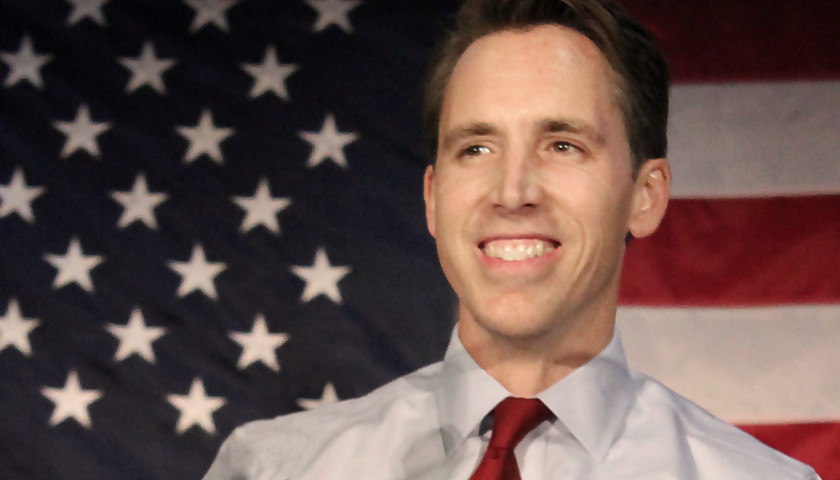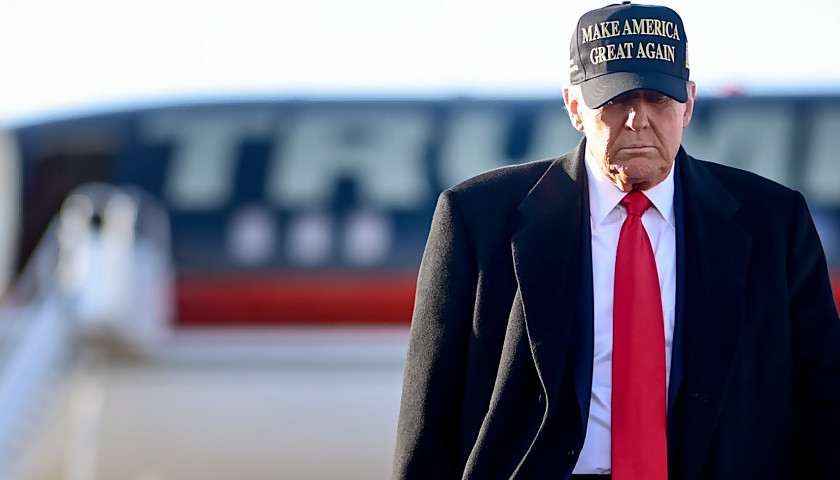by Rachael Bovard
Senator Josh Hawley (R-Mo.) has wasted very little time in becoming one of the most important senators in this new freshman class.
From introducing provocative legislation to go after Big Tech, to roiling Washington’s legal establishment by insisting that President Trump’s judicial nominees be thoroughly vetted, to declaring the need for a “new consensus” in our politics, Hawley has become a polarizing figure among liberty-minded conservatives and libertarians – especially those who have not had their assumptions about the world challenged from the Right in decades.
But Hawley is not just challenging political and cultural orthodoxies. This week, he’s challenging economic ones as well.
With the introduction of the Competitive Dollar for Jobs and Prosperity Act, the senator teams up with Tammy Baldwin (D-Wis.) to upend conventional Republican beliefs about the relative strength of the dollar.
Questions about the dollar’s relative value are usually reserved for global financiers, CNBC anchors, or beard-stroking academics. But once the basics of economic theory are understood, the real-world consequences become much easier to understand.
The value of the American dollar is determined by the demand for it, at home and internationally. One of the key metrics governing the dollar’s value is foreign exchange reserves – that is, the amount of U.S. dollars held by foreign governments. The more they hold, the lower the supply. That makes U.S. money more valuable.
A consequence of a high value U.S dollar is that U.S. exports become more expensive. And, conversely, countries with a lower valued currency are able to sell their goods more cheaply.
Some of our craftier trading partners have figured this out. China and around 20 other countries have used billions in their public funds to buy up U.S. securities – $21 billion just last year, according to Fed data – thereby charging up the value of the U.S. dollar against their own currency, and making their own exports very price competitive as a result.
This, in part, explains the currency manipulation about which everyone from President Trump to Senator Elizabeth Warren (D-Mass.) has complained. As the dollar increases in value and our exports become more expensive and thus, less consumed abroad, jobs at home decline. Particularly manufacturing jobs.
It seems counterintuitive, but it’s true. A strong American currency results in diminishing manufacturing jobs, due to the decreased demand for our increasingly expensive goods.
According to some estimates, a strong dollar has led to the elimination of nearly 5 million good-paying manufacturing jobs over the past two decades, and the closure of some 900,000 factories. For those workers who keep their jobs, trade with low-wage countries is estimated to pull down the incomes of 100 million non-college educated workers by roughly $2,000 a year.
There are, however, sectors of the economy which benefit from a strong dollar. Nearly all of them are on Wall Street. The same things that hurt middle American manufacturing jobs – cheap imports – are a boon to financiers. Cheap imports fuel massive profits for big multinational corporations like Apple, Amazon, Costco, and Walmart.
Over the last two decades, the equation has been tilted in favor of Wall Street, and manufacturing jobs have suffered as a result.
Hawley and Baldwin’s bill attempts to re-balance this equation, placing a “market access charge” on foreign purchase of U.S. stocks, bonds, property, and other U.S. assets in an effort to reduce the ability of foreign nations to overvalue the U.S. dollar to their own benefit. Supporters of this approach say it will reduce the dollar’s value and improve performance of U.S. goods abroad, without discouraging the purchase of long-term assets such as factories.
The effort is not without precedent. President Richard Nixon realigned the dollar in 1971, and President Ronald Reagan followed suit in 1985. Fed data shows little evidence that economic growth suffered as a result, though economists have differing opinions as to the effect.
An Overdue, if Polarized Debate
Like many things Hawley does, this one will no doubt elicit a polarizing response. Many of those on the reflexive Right will label him an anti-market, anti-free trader, while a corresponding number of those on the Left will not take him seriously.
But Hawley is once again proving that he is starting the right conversations at a critical moment in our politics.
While we can argue the merits of his economic approach, the broader themes of this bill and of many others Hawley is championing are worthy of consideration: have we over-empowered corporate entities and global finance, and have we done so to our own detriment? Are we now sacrificing the interests of individual Americans – in this case, thousands of manufacturing jobs for non-college education workers – for a Wall Street benefit that increasingly results in only a few becoming extremely wealthy?
Sen. Hawley formulated this at a recent speech to the Conference on National Conservatism, where he asked the provocative question of whether the current political consensus that has resulted in the current economic arrangement has served us well.
. . . in this bargain, foreign competitors get to make the goods, and we just buy them. And then they buy up American companies with the profits. And yes, in this bargain there are lots of jobs — jobs on Wall Street, or in Hollywood, or in Silicon Valley.
Because the truth is, the cosmopolitan economy has made the cosmopolitan class an aristocracy. At the same time, it has encouraged multinational corporations to move jobs and assets overseas to chase the cheapest wages and pay the lowest taxes.
And it has rewarded these same corporations for then turning around and investing their profits not in American workers, not in American development, but in financial instruments that benefit the cosmopolitan elite.
In questioning the outcomes of a decades long political consensus between social conservatives and economic libertarians, Hawley has provoked the ire of those who consider free markets the equivalent of dogma – something so self-evident that it shouldn’t need a defense.
But old assumptions and orthodoxies need dusting off and brushing up every once in a while, particularly when both Republicans and Democrats in Middle America continue to feel left behind, ignored, and condescended to by the parties that are supposed to be representing them.
Robust trade and free markets undoubtedly have made America richer, better, and the most successful country on the planet. That is without question. But Hawley is forcing the Right to into an assessment of whether their economic theories about the way the market is supposed to work align with how the market is actually working.
Is it really “free trade,” to allow foreign governments openly to abuse our financial system for the purposes of undercutting our own manufacturing products, while we sit back and do nothing in response?
And is it really a “free market” when Wall Street manipulates the tax system to their own benefit, and gets consequence free, taxpayer-funded, billion-dollar bailouts when it screws up, nearly tanks the economy, and costs millions of Americans their lifelong savings?
Maybe the answer to both these questions is yes, and maybe Hawley’s pursuit of these policy corrections is misguided. But the conversation he is starting is not out of line. Their dismissal of it is.
And it’s to the benefit of everyone on the Right to welcome an honest assessment of the realities in the current marketplace, test whether old assumptions still apply, and either attack or defend them with the intellectual rigor our politics deserve.
– – –
Rachel Bovard is senior director of policy at the Conservative Partnership Institute. Beginning in 2006, she served in both the House and Senate in various roles including as legislative director for Senator Rand Paul (R-Ky.) and policy director for the Senate Steering Committee under the successive chairmanships of Senator Pat Toomey (R-Penn.) and Senator Mike Lee (R-Utah), where she advised Committee members on strategy related to floor procedure and policy matters.
Photo “Josh Hawley” by Natureofthought CC4.0




